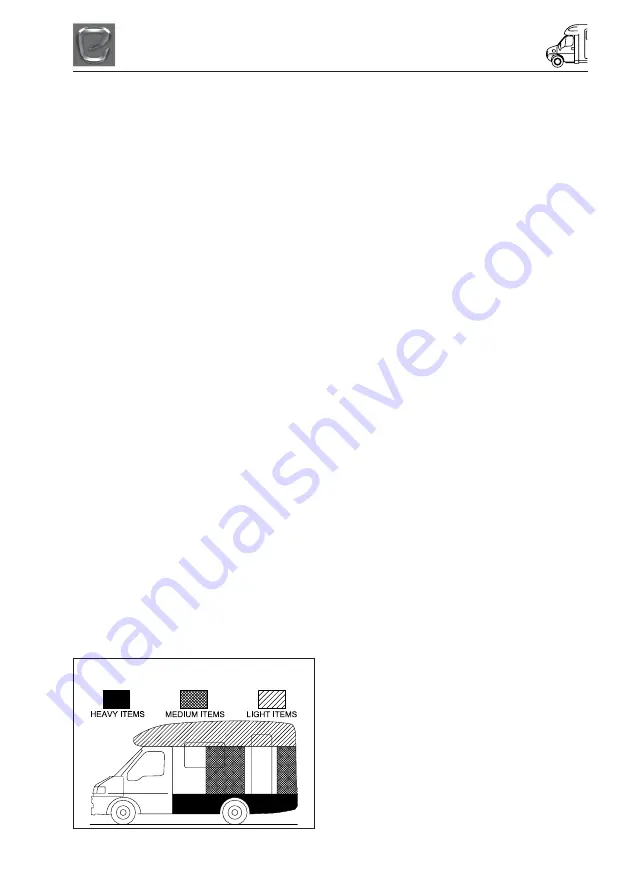
3-1
PREPARING FOR THE ROAD
PREPARING FOR THE ROAD
Before venturing out on to the road with your
motorhome, it is important that you prepare
correctly.
MOTORHOME WEIGHTS EXPLAINED
Mass in Running Order
The weight of your motorhome as it leaves
the factory, as new with standard fixtures and
fittings, plus an allowance for the driver of
75kgs, the mass of the fuel when the tank is
full and an allowance of 10kgs per gas bottle,
the number of gas bottles equal to the
number of connections provided at the
regulator.
Maximum Technically Permissible
Laden Mass
The maximum mass the vehicle can be when
fully laden for use on the road.
User Payload
The load margin (payload), this represents
the difference between the Mass in Running
Order and the Maximum Technically
Permissible Laden Mass. It shows the
maximum weight that can be loaded into your
motorhome, covering items such as food,
crockery, cutlery, clothing, bedding, etc.
Loading
It should be noted that even weight
distribution is a major factor in making your
motorhome an easy and pleasant vehicle to
drive. Care should therefore be taken in
balancing the load, ensuring that heavy
items are well spaced and are in as low a
position as possible, for example, low
cupboards and bed boxes.
Note:
Light items are considered as clothing
and bedding. It is not recommended to travel
with tinned items in overhead lockers.
IMPORTANT: Do not exceed maximum
technical permissible laden mass for your
motorhome.
BEFORE MOVING OFF
Whenever making a journey with your
motorhome, either setting off on holiday or
returning home, it is good practice to run
through this simple checklist.
(i)
Close and secure all cupboards and
drawers and secure any loose articles.
(ii)
Do not store tins, bottles, etc. in
overhead lockers.
(iii)
Close and secure all windows and
roof lights.
(iv)
Leave all curtains and blinds open to
aid visibility.
(v)
Check that gas cylinders are securely
fastened and that the valve on the gas
cylinder is turned off. Also ensure that
the gas locker door is securely locked.
(vi)
Turn off all gas appliances.
(vii)
Switch off 240volt supply at source;
disconnect mains cable and store in an
appropriate place.
(viii)
Check that the battery is secure and
that the battery box lid is sealed and
secure.
(ix)
Ensure the fridge is on 12V operation
and door lock is set. (Note: the
electrical relays will allow the fridge to
be run on the vehicle battery when the
engine is running.)
(x)
Remove any external fresh water
connections etc.
(xi)
Make sure any heavy articles are
stored in accordance with the loading
procedure.
(xii)
Lock the motorhome habitation door
(remember to take out your keys).
(xiii)
Check your external rear view mirrors
and adjust if necessary.
(xiv)
If a step is used, ensure it is put away
before moving off.
SENSIBLE LOADING
HOW TO APPORTION WEIGHT
Summary of Contents for encore
Page 11: ...4 2 MOTORWAY HANDLING ...
Page 13: ...5 2 ARRIVING ON SITE ...
Page 19: ...6 6 GETTING STARTED ...
Page 21: ...7 2 GAS SAFETY ADVICE ...
Page 24: ...8 3 ELECTRICAL SYSTEM MAINS UNIT ENCORE ...
Page 25: ...8 4 ELECTRICAL SYSTEM ...
Page 63: ...9 38 HOW TO USE YOUR MOTORHOME S EQUIPMENT ...
Page 65: ...10 2 SECURITY ...
Page 69: ...11 4 CARE OFYOUR MOTORHOME ...
Page 71: ...12 2 STORAGE ...
Page 75: ...13 4 WARRANTY ...
Page 77: ...14 2 MOTORHOME CONSTRUCTION ...
Page 79: ...15 2 EQUIPMENT LIST ...
Page 80: ...16 1 ELECTRICAL DRAWINGS ELECTRICAL DRAWINGS ENCORE ...
Page 81: ...16 2 ELECTRICAL DRAWINGS ...
Page 87: ...18 4 GLOSSARY ...
Page 95: ...20 2 CHANGE OF OWNERSHIP ...
Page 97: ...21 2 CHANGE OF ADDRESS ...

























